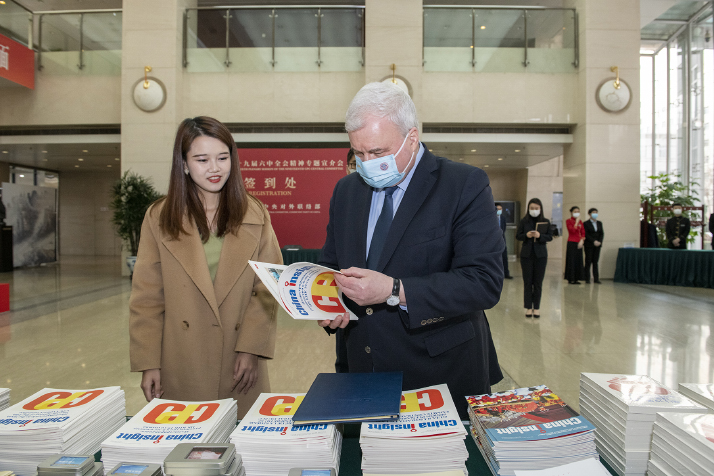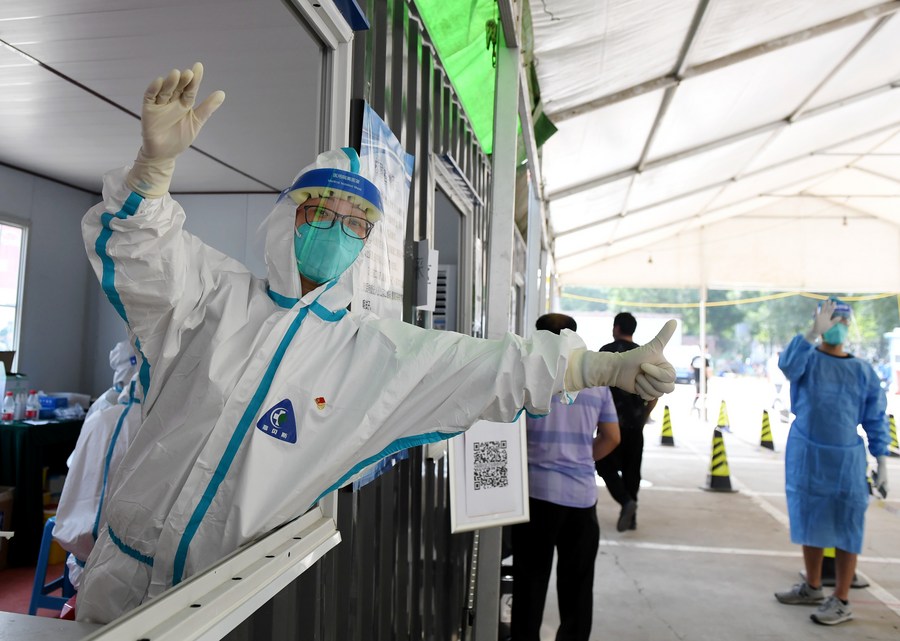A Briefing for Foreign Diplomats on China’s Experiences

Over the past century, China has become an important player in safeguarding and promoting international and regional peace, stability, development as well as connectivity.
As the offspring of a Chinese immigrant, Madagascar’s Ambassador to China Jean Louis Robinson has every reason to explore his ancestral roots in China and learn about its development.
His grandfather moved to Madagascar from Foshan, a city in Guangdong Province. In 2008, Robinson returned to Foshan for the first time in search of all things related to his lineage. After years of frequent visits, when Robinson saw local members of the Communist Party of China (CPC) testing out various measures to help villagers out of extreme poverty and promote rural development, he came to realize why China was able to achieve such rapid progress in various fields. That was the story he shared at a thematic briefing held on November 19 on the recently concluded Sixth Plenary Session of the 19th CPC Central Committee.
The briefing, hosted by the International Department of the CPC Central Committee (IDCPC), gathered some 100 senior diplomats and 500 representatives of different organizations from around the globe. Representatives reviewed the experiences and history of the CPC in the past century, and how it successfully turned China from a war-torn country into one of the world’s largest economies.
The diplomats in attendance hailed the achievements of the CPC, saying the key Party meeting will chart a new course for China’s future. They also commended the CPC’s governance philosophy and expressed their hopes to develop more of these exchanges between China and their own countries.

The CPC resolution
The sixth plenum, which took place from November 8 to 11, adopted a landmark resolution on the major achievements and historical experiences of the CPC over the past 100 years.
Chinese President Xi Jinping, also General Secretary of the CPC Central Committee and Chairman of the Central Military Commission, said at the meeting that the review of the major achievements and historical experiences of the Party over the past century “will help build a broader consensus and stronger unity in will and action among all members and rally and lead Chinese people of all ethnic groups in achieving new and great success in building socialism with Chinese characteristics in the new era.”
Mohamed Elbadri, Egyptian Ambassador to China, said the resolution is “unprecedented.” It reflects the Party’s position on the country’s future development path as well as its views about the development of human society at large, he added.
The CPC played a critical role in helping China achieve national independence, stability and prosperity, he said, and it overcame difficulties and triumphed over setbacks in its 100-year history. Today, the Party is making unremitting efforts to improve the lives of the Chinese people.
“We hope to build a world of peace, equality and progress, a world free of threats and power politics; only in such a world can every country realize its full potential,” Ivica Dačić, First Deputy Prime Minister and Minister of Foreign Affairs of the Republic of Serbia, said, adding that China’s proposal of building a community with a shared future for humanity, as emphasized in the resolution, can apply to all.
Russian Ambassador to China Andrey Denisov highlighted the CPC’s people-centered development philosophy, saying he was impressed by its approaches of “putting people first” and “serving the people wholeheartedly,” most specifically in terms of poverty elimination and the fight against the COVID-19 pandemic.

The CPC pays great attention not only to individual development, but also to the growth of society at large, he said.
Many countries are looking to China to learn from those governance experiences, Elbadri said, adding that he was impressed by the Party’s strong leadership in eliminating absolute poverty nationwide as well as in containing COVID-19.
The resolution demonstrates the Party’s strong commitment to upholding socialism, its adherence to seeking the truth from practice, and its consistent efforts to serve the people, Khamphao Ernthavanh, Lao Ambassador to China, echoed Denisov.
“Over the past century, China has become an important player in safeguarding and promoting international and regional peace, stability, development as well as connectivity,” she said.
Citizen satisfaction
Countries should transcend their differences to develop relations on the basis of mutual respect and oppose the use of human rights to meddle in other countries’ internal affairs, Khuon Sudary, Second Vice President of the National Assembly of Cambodia, said during the briefing.
“The democracy of a country should fully demonstrate the will and demands of its people, instead of being exploited as a tool to pursue its political interests,” she added.
Reverberating with Xi’s remarks that people’s democracy in China is a type of whole-process democracy, Denisov said that the economic progress and the increasing happiness of the Chinese people demonstrate that the Chinese democracy is best suited to its own national conditions.
The American attempts to classify people and countries into democratic and undemocratic ones were wrong and only make the world suffer, Denisov said.

His words came as the U.S. prepares to host the first of its two Summits for Democracy on December 9 and 10. The criteria are set by the U.S. “There are only 30 to 35 countries in the world that can be regarded as democracies, which represents a minority as there are almost 200 countries that are members of the United Nations,” he said.
Moreover, the U.S. itself is hardly a shining model of democracy. The Pew Research Center, a nonpartisan U.S. think tank, issued a report on November 1, saying that 72 percent of Americans believe their own political system is no longer a good example for other countries to follow. The report further read that 23 percent of those polled do not believe it has ever set a leading example in the first place.
“The U.S. has experienced a series of severe domestic problems in recent years, putting them in a position far from one that could be considered ‘the prototype of a democratic country’,” Denisov said. China, on the other hand, has presented the world with achievements both in battling COVID-19 and the ensuing economic downturn.
According to a survey published by The Washington Post in May, the Chinese Government’s handling of COVID-19 has actually enhanced its citizens’ trust in the government, and led to an overall high level of satisfaction with government performance.
 Facebook
Facebook
 Twitter
Twitter
 Linkedin
Linkedin
 Google +
Google +










